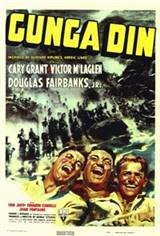Gunga Din
Though Rudyard Kipling's poem Gunga Din makes a swell recital piece, it cannot be said to have much of a plot. It's simply a crude cockney soldier's tribute to a native Indian water boy who remains at his job even after being mortally wounded. Hardly the sort of material upon which to build 118 minutes' worth of screen time-at least, it wasn't until RKO producer Pandro S. Berman decided to convert Gunga Din into an A-budgeted feature film. Now it became the tale of three eternally brawling British sergeants stationed in colonial India: Cutter (Cary Grant), McChesney (Victor McLaglen) and Ballantine (Douglas Fairbanks Jr.). Ballantine intends to break up the threesome by marrying lovely Emmy Stebbins (Joan Fontaine), while Cutter and McChesney begin hatching diabolical schemes to keep Ballantine in the army (if this plot element sounds a lot like something from the Ben Hecht and Charles MacArthur play The Front Page, bear in mind that Hecht and McArthur shared writing credit on Gunga Din with Joel Sayre and Fred Guiol; also contributing to the screenplay, uncredited, was William Faulkner). All three sergeants are kept occupied with a native revolt fomented by the Thuggees, a fanatical religious cult headed by a Napoleonic Guru (Eduardo Ciannelli). Unexpectedly coming to the rescue of our three heroes-not to mention every white man, woman and child in the region-is humble water carrier Gunga Din (Sam Jaffe), who aspires to become the regimental trumpeter. Originally slated to be directed by Howard Hawks, Gunga Din was taken out of Hawks' hands when the director proved to be too slow during the filming of Bringing Up Baby. His replacement was George Stevens, who proved to be slower and more exacting than Hawks had ever been!
| Cast: | Victor McLaglen, Sam Jaffe, Joan Fontaine, Cary Grant, Abner Biberman, Montagu Love, Robert Coote, Douglas Fairbanks Jr., Eduardo Ciannelli |
| Director: | George Stevens |
| Producer(s): | George Stevens |

